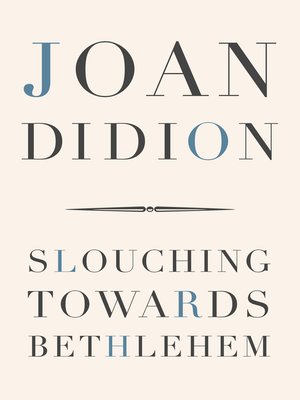

I imagine my mother reading about a gathering of earnest young activists and intellectuals "reluctant about gathering up their books and magazines and records, about finding their car keys and ending the day, and by the time they are ready to leave Joan Baez is eating potato salad with her fingers from a bowl in the refrigerator, and everyone stays to share it, just a little while longer where it is warm" and wishing she were in their midst, instead of pushing a shopping cart down the aisles of Pak-n-Save, filling it with boxes of Kraft Mac-n-Cheese and Hamburger Helper. While her days were filled with Sesame Street, Tang, laundry, cutting crusts from bread for fussy her elementary school-kids' lunches, Joan Didion was writing of the counterculture of Haight-Ashbury, where runaways were drugged and traded as sex toys, used up and strung out by nineteen of Howard Hughes buying up blocks of Las Vegas like she bought boxes of Cheerios of Joan Baez, wispy, earnest, and reclusive in the Monterey County Courthouse, trying to save her Institute for the Study of Non-Violence from the squares who worried that the hippies would drive down their property values.ĭid my mother dream California dreams? Did she wish for a New York interlude, to be young and in love, with a view of the Brooklyn Bridge, such as Joan Didion had in 1960s? Did she yearn for the warm waves of the Pacific curling on the sands of Hawaii? Such freedom young Didion had, such time to feel angst, to observe others, to write clear-eyed and fiercely about her time and place in a world where people filled their voids with drugs, sex, and rock-n-roll. I wonder what my mother must have thought of this collection of essays about people, places, lifestyles so radically different than anything in her experience, yet which were happening simultaneous to her sheltered life. nothing but trouble can come from such a book.

I recall loving the title-the evocation of the Bible that seemed almost sacrilegious to me, a child of a conservative Christian family. I felt the book must be some passageway to adulthood, some essentialness of feminism that both intrigued and bored me. I recall her clutching the book as though it were a lifeline, a rope to a past she never had. I recall the cover: gun-metal gray with white lettering. She majored in English and one day brought home, as a reading assignment, a copy of Slouching Towards Bethlehem.

It wasn't until she divorced at thirty-six, the same year Ronald Reagan ushered in the folly of trickle-down economics and the prison-industrial complex, that she discovered "the sixties". Married at seventeen, her 1960s and 70s were spent as a young wife and mother of four. My mother was a freshman in college when I was a freshman in high school.


 0 kommentar(er)
0 kommentar(er)
